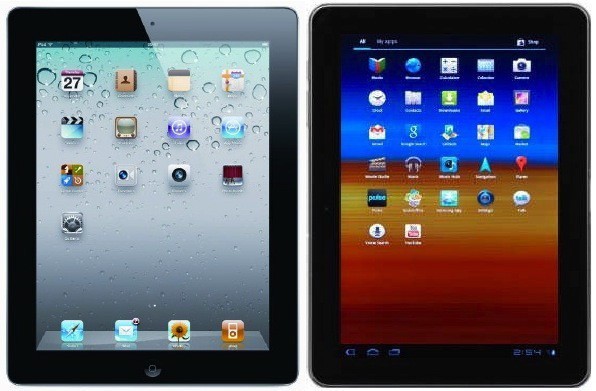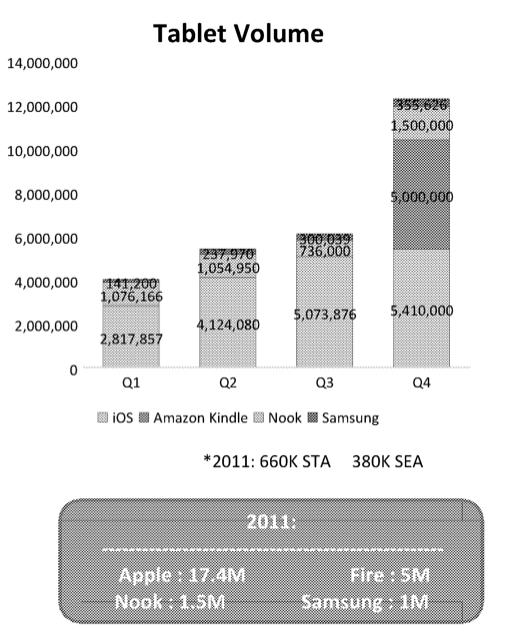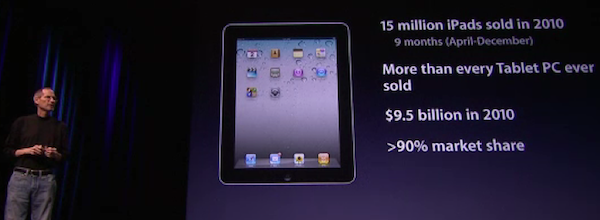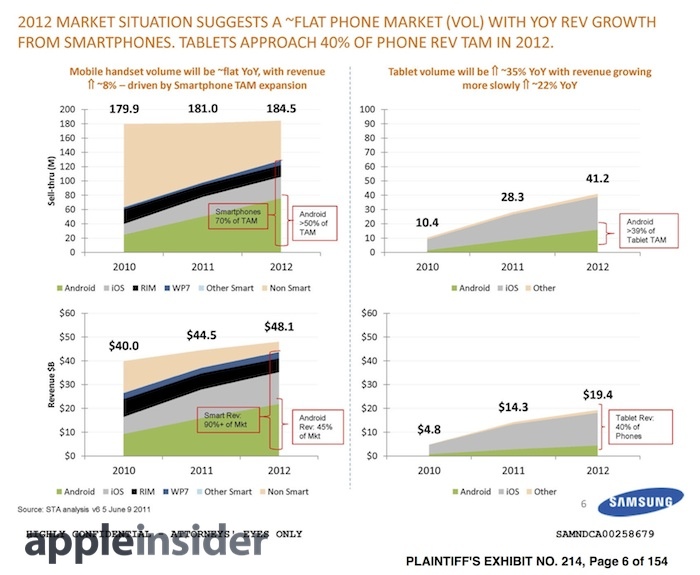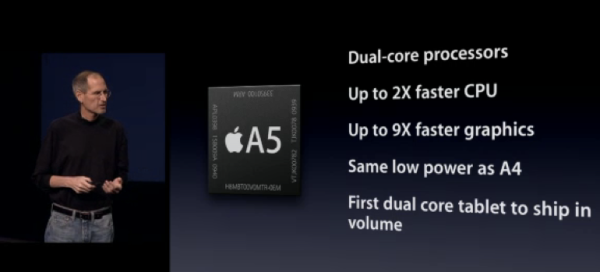Samsung, the South Korean chaebol, has an established history of stealing, cheating and lying. It’s not just the conviction of stealing patented iPhone technology that dealt it a massive PR blow, Samsung was also publicly shamed over the discovery it had paid people to spam message boards with negative comments about rival products.
And as if that weren’t enough, its shady marketing tactics has come to light yet again in an internal document proving Samsung intentionally misled Wall Street investors, analysts and market watchers by flatly lying about sales of its Galaxy tablets, thereby creating a perception that the iPad was losing massive market share to cheaper Android competitors…
Thanks to Apple which uncovered a February 2012 internal Samsung document marked “top secret” as part of its ongoing patent infringement proceedings, we now know that Samsung’s U.S. sales of the Galaxy Tab tablets in 2011 were even behind Barnes & Noble’s ill-fated Nook e-reader!
Whereas throughout 2011 Samsung sold just under a million tablets in the U.S., Apple was able to sell 17.4 million units domestically and over 32 million iPads globally. Mind you, Samsung at the time was boasting sales of two million Galaxy Tabs in six weeks, enough to artificially reduce the iPad’s market share by 20 percentage points.
Image via Fortune.
But how the heck is Samsung able to get away with lying about numbers?
For starters, Galaxy Tab data came via research firm Strategy Analytics and Samsung is a client of theirs.
As you’d expect, once Strategy Analytics put out its flawed 2011 numbers, rival market survey firms like IDC and Gartner went equally creative in guesstimating global tablet sales, all in the service of conveying the notion that Android tablets were winning while Apple’s iPad was supposedly dead in the water.
Diluting the truth is easy when you only work from sales estimates.
Conveniently enough, Samsung in the summer of 2011 stopped reporting smartphone and tablet sales, citing competitive reasons. In fact, most handset makers followed suit, but not Apple. This means that IDC, Gartner and Strategy Analytics numbers represent estimates of shipments, not the actual sales.
Contrast this to Apple, which reports sales rather than shipments.
When a product is shipped, it’s left the warehouse and has yet to be bought by end users. Thanks to its enormous scale – Samsung has a vast network of resellers, third-party stores and other points of sale – the firm is in a comfortable position where it’s able to boast shipments in the millions whereas in reality it could be just filling up the channel.
Image via AppleInsider.
Apple reports a sale when a product is sold directly to an end user via its online or brick-and-mortar stores, or indirectly to its retailers and carrier partners. Once a carrier or an authorized reseller pays for stock and the shipment arrives – a retailer can’t return products to Apple as the money has already changed hands.
Another factor playing to Samsung’s favor: some media outlets which absolutely have no regard whatsoever for fact-checking and story accuracy and are only after clicks.
Case in point: Strategy Analytics in January 2011 claimed two million shipments of Galaxy Tabs in 2010, based on a Samsung executive’s vague comment made to investors. The Wall Street Journal soon after discovered that the figure represented shipments of initial inventory sell-in designed to fill the channel, not actual end-user sales.
That didn’t stop Strategy Analytics to reduce Apple’s market share estimate to 75 percent from 95 percent in less than six weeks. Click-hungry media happily ran sensationalist headlines with Samsung’s inflated numbers.
A few examples:
- VentureBeat: “Android steals tablet market share from Apple’s iPad”
- Huffington Post: “Android tablets eat away at iPad’s lead”
- Computerworld: “Android tablets sales skyrocket, a clear sign that they’ll dominate the iPad.”
Fortune knew better and headlined its story as ‘Android grabs 22% tablet share – not!’
Some went so far as to call Steve Jobs a liar and prematurely call Android a winner in tablets, like the then Fortune writer Seth Weintraub, who now runs 9to5 blogs.
Addressing Apple’s iPad 2 event in 2011 with a surprise Steve Jobs appearance, Weintraub wrote Apple “twisted facts and used an erroneous quotation to try to convince crowds that all other tablets had no shot at de-throning the iPad in 2011.”
Perhaps Jobs could have also compared the iPad 2 to other Android tablets’ prices? Samsung’s Galaxy Tab and Dell’s Streak both now start at $499 and have better cameras, 3G radios and GPS, which seem to compete well with Apple’s $499 Wifi-only offering. Reality distorted.
The author even suggested that a Dell Streak 7 was “shipping in volume” and that the then new Motorola Xoom “is certainly shipping in volume as well.”
Does anyone remember these tablets now?
Fortune’s Philip Elmer-DeWitt summed it up best:
When Strategy Analytics was telling the world that Samsung sold 2 million Galaxy Tabs in six weeks, the truth was that it took Samsung all of 2011 to sell half that many.
To paraphrase the 1942 American romantic drama film, Casablanca, I’m shocked, shocked to find that Samsung lied about own tablet sales, that research firms spoon-fed inaccurate data to the press and that credulous media outlets happily ran Apple doomsday headlines without doing their homework.
I’m sorry if you feel otherwise, but for Samsung – stealing, cheating and lying seems to be business as usual, the fact bloggers and big media alike are well aware of.
